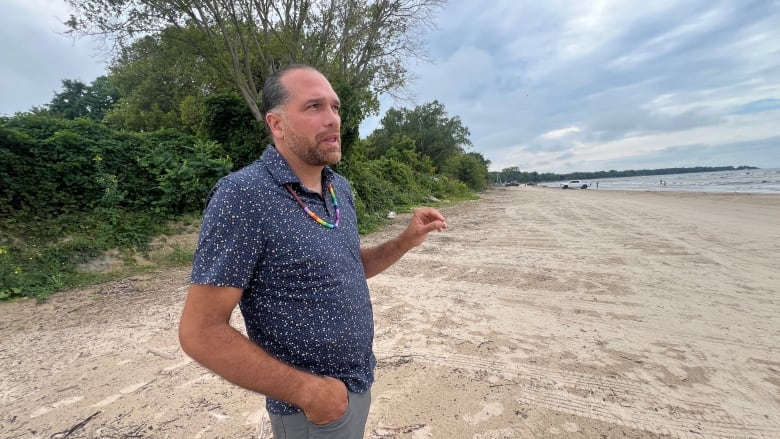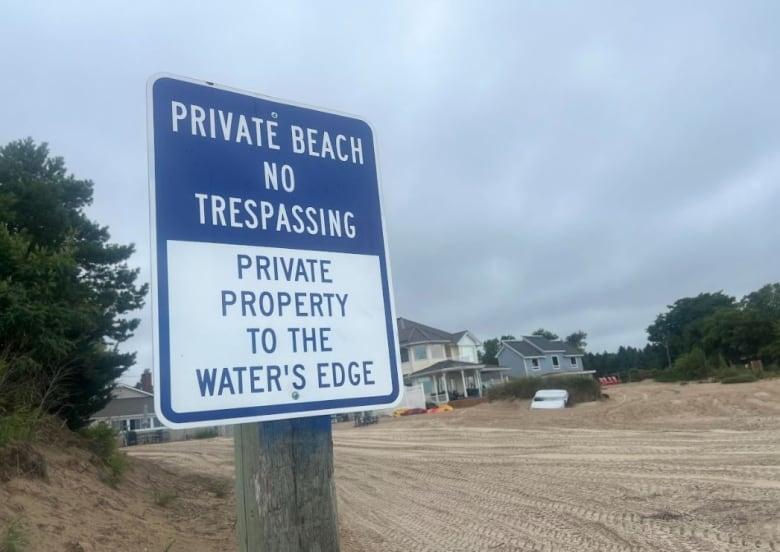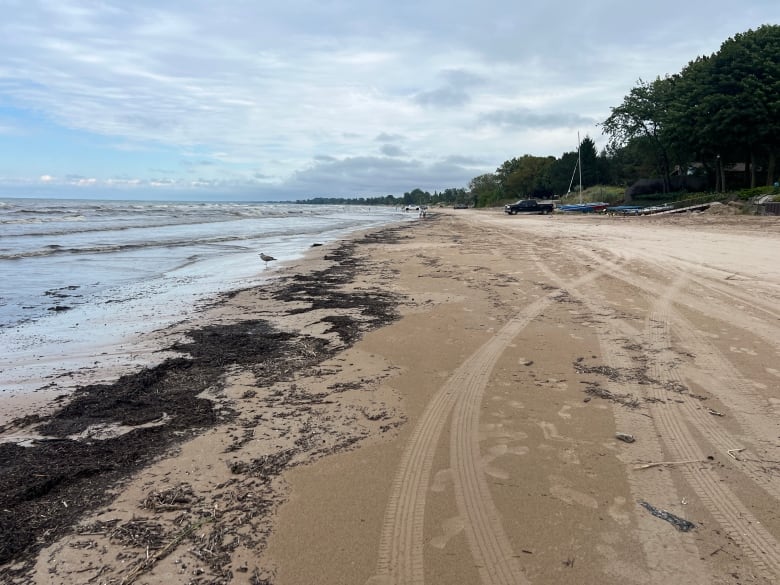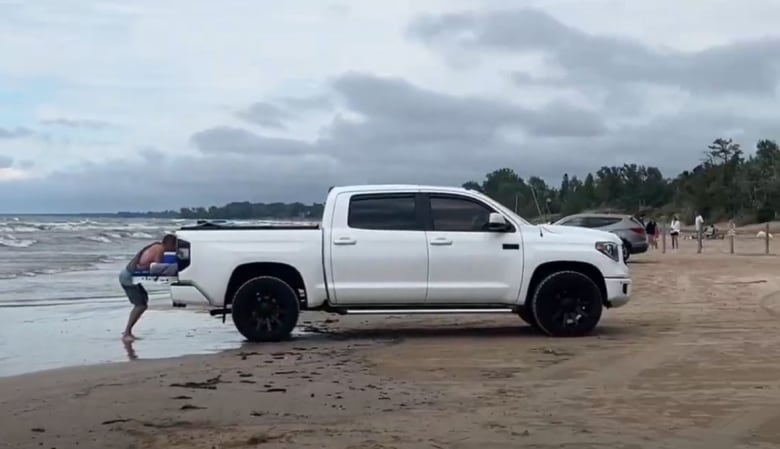Should vehicles be allowed on Ipperwash Beach? Indigenous group and property owners square off
Long-held conflict centres on issues of ownership, access along stretch of Lake Huron shoreline in Ontario

To be at the water's edge and gaze along the length ofWest Ipperwash beach in southwestern Ontariois to put yourself inside apostcard.
Waves break over long stretches of white sand and vistas of deep blue water stretch uninterrupted to the horizon. On sweltering days when the temperaturetips toward 30 C, there's a constant and refreshing breeze.
"Ipperwash Beach is a beautiful thing," said Jason Henry, a community member and former chief of the Chippewas of Kettle & Stony Point First Nation. "The sand, the lake, the wateris so beautiful. That's why people have been coming here and coming back for years. It's paradise."
But last weekend, there wastrouble again atthis idyllic beach between Sarnia and Grand Bend that's on traditional Indigenous land andadjacent to theFirst Nation.
A video on the area's Facebook page showed a shouting match between a property owner and First Nation members who showed up to conduct a "beach cleaning." As well as removing trash and debris, it included pullingdown sand berms, fences, signs and other items property owners had placed on sections of the beach in front of their properties.

Although police were called, the dispute didn't escalate into a physical confrontation. The beach cleaning, which involved chainsaws and other motorized equipment, went ahead. Most material being used by property owners to mark out a personal usearea of the beach in front of their properties was removed.
Representatives of Kettle & Stony Point and a group that represents cottage owners plan to meet next week to discuss the incident and avoid further conflict.
The band's current chief, Kimberly Bressette,did not respond to an email request for comment.
"It will be good to sit down, and just hash everything out and get back on track," said Dave Bowen, president of the West Ipperwash Property Owners Association. "We want to work out a compromise like we always have."
First Nation sold beach properties
Disputes over beach access between property owners and the First Nation stretchback decades.
In 1926, Kettle & Stony Pointsold 83 acres (about 33.5 hectares) of the beachfront property for development into cottages and year-round homes.
In the 1990s, efforts by Kettle& Stony Pointto challenge that land sale in court were denied in a series of legal challenges that ended with a Supreme Court decision.

Central to the dispute is the question of who has access to the beach.
While many property owners point to deeds that show their property lines extending to the water, both sides have tried to strike a balance between allowing public access to the beach that doesn't infringe on property owners' desire to preserve their enjoyment of it.
The Supreme Court decision didn't make a definitive ruling on the question of who owns the beach in front of the cottages. Instead, it left both sides to manage beach access.
Vehicle access and safety
In 2016, a memorandum of understanding (MOU) was signed between the First Nation and the property owners' association. It allowed public access to the beach, but also gave property owners a zone allowing them 25 feet (about 7.6 metres) of beach in front of their properties for personal use.
Bowen said the 25-foot zone is crucial for safety because of the longstanding practice of allowing vehicles to drive along the beach. The zone forces beach visitors to park near the water, which he said is safer.
"We want people to park at the water's edge," he said. "We didn't want people parking back against the seawalls or further back because the kids would run from the car to the beach and back again, and there would be traffic going back and forth, so it would be very dangerous."

Part of the 2016 MOU required the First Nation to charge drivers to park on the beach, but both Bowen and Henry said that stoppedin 2018.
Henry said the $15 parking charge couldn't cover the expense of staffing a gatehouse and policing the parking.
'A drive-on beach'
As for the question of why vehicles are allowed on the beach at all, Henry said disallowing it would remove a crucial aspect of what makes the beach unique and accessible for all.
"One of the most amazing things about IpperwashBeach is that it's been a drive-on beach for decades," said Henry. "You can pull your family up, open the back of the minivan, pull out your lawn chairs and be at the beach all day with everything right there for you. That has been the attraction at the beach forever. I support itbecause that's the beauty of this."
The 2016 MOU expired in 2019.
Henry and Bowen saidthey have a good working relationship and talk regularly. Both agree a new memorandum of understanding would address a lot of issues. However, Henry said, the 25-foot personal use zone would have to go because rising water levels on Lake Huron mean the beach is no longer wide enough to allow it. As for the safety issue, Henry suggests this can be addressed by policing the 10 km/h speed limit andby parents keeping a close eye over their children.
Bowen, meanwhile, said most members of his organization are in favour of barring vehicles from driving along the beach.
Both sides hope to address some of the outstanding issues with the meeting tentatively scheduled for next week.
'There to be shared'
Henry and Bowen agree the beach ownership questions can likely only be solved with more court challenges. Outside of that, Henrysaid, he'd like to see the beachshared between members of the First Nation, visitors andlakefront property owners. Underpinning it all, Henry said, must be anunderstanding that Indigenous people have a connection to the beach that predates colonial times.
"It's actually against Indigenous principles to talk about land ownership," he said. "The Earth is our mother and she's there to be shared. You have to understand that you are buying a piece of paradise with a beach that you don'texclusively own. You have to share that."
Henry has a photo from the 1950s of his grandparents parked near the water's edge, enjoying a sunny day at the beach. It's an experience he hopes can be preserved for others in the future if both sides are willing to buy in to the overriding principlesof mutual respect and shared access.
He said allowing property owners to cordon off parts of the beach for their own use plays into a notion of "exclusivity" he feels runs counter to the concept of shared access.
"Some education about that just needs to happen," said Henry. "There's been a terrible history in Canada where the colonial process has taken land and land rights from Indigenous people. We have a spiritual connection to the land, not a monetary connection, not a fee simple connection.We want the beach to be shared by all."













_(720p).jpg)


 OFFICIAL HD MUSIC VIDEO.jpg)
.jpg)



























































































